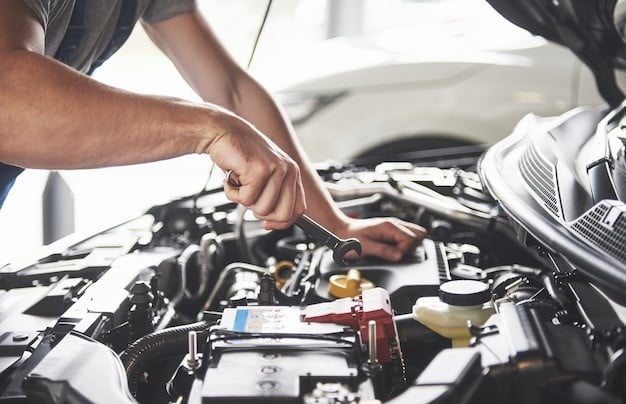
You’ve just bought your first car—congratulations! The thrill of the open road is at your fingertips, and the possibilities seem endless. But with great power comes great responsibility, as they say, and owning a car is no exception. Sure, driving is fun, but keeping your car in tip-top shape? Not so much. That’s why finding a reliable auto mechanic is key to ensuring your vehicle remains a source of joy, not stress.
It’s easy to find an “auto mechanic close to me” with a quick search on your phone, but how do you ensure they’re the right one? Knowing the right questions to ask can make the difference between a smooth ride and a breakdown waiting to happen. Here’s a comprehensive guide to help you navigate the sometimes intimidating world of auto repairs.
What Are Your Certifications and Experience?
Let’s start with the basics. When you visit a doctor, you trust them because they’ve gone through years of education and training. The same principle applies to auto mechanics. Certifications like ASE (Automotive Service Excellence) are a good indicator that the mechanic has the knowledge and experience needed to work on your vehicle. But don’t stop there—ask about their experience with your specific car make and model.
For instance, if you drive a European car, you’ll want to make sure the mechanic has experience with European vehicles. These cars often have different systems and require specialized knowledge. The same goes for hybrid or electric vehicles. A mechanic who usually works on older gas-powered cars might not be the best choice for your high-tech, eco-friendly ride.
Check the Mechanic’s Reputation
Before making your final decision, take a few minutes to check the mechanic’s reputation online. Websites like Yelp, Google Reviews, and the Better Business Bureau (BBB) offer insights into other customers’ experiences. Look for an auto mechanic close to me with consistently high ratings and positive feedback. Pay attention to how the shop responds to negative reviews—this can tell you a lot about their customer service and willingness to address issues.
Can You Provide an Estimate in Writing?
We all know that sinking feeling of getting a bill that’s way higher than expected. To avoid this, always request a written estimate before any work begins. This isn’t just about money—it’s about transparency and trust.
A comprehensive estimate should include a breakdown of parts, labor, taxes, and any additional fees. But there’s more—ask if the estimate is a “quote” or an “estimate.” A quote is a fixed price, while an estimate can change based on what the mechanic finds during the repair. Clarifying this upfront can save you from surprises later.
You might also want to ask about the shop’s policy on additional repairs. Will they contact you before doing any extra work, or might you find extra charges on your bill without warning? Clear communication on these points will help you avoid any misunderstandings.
How Do You Source Your Parts?
You’ve probably heard the saying, “You get what you pay for.” This is especially true when it comes to car parts. Parts quality can vary greatly, and it can directly affect your car’s performance and safety.
OEM (Original Equipment Manufacturer) parts are made by the same company that made the original parts for your car. They’re usually more expensive but offer the best fit and reliability. On the other hand, aftermarket parts are made by third-party manufacturers. These can range from high-quality to subpar, so it’s important to ask your auto mechanic close to me about their sources and whether they’re using OEM or aftermarket parts.
In some cases, your mechanic might suggest using reconditioned or recycled parts to save money. This can be a good option for certain repairs, but make sure to ask about any potential drawbacks. For example, reconditioned parts may not last as long as new ones, which could lead to more frequent repairs in the future.
Do You Offer Warranties on Your Work and Parts?
Let’s say you just got your brakes fixed, and two weeks later, they start squealing again. If your mechanic offers a warranty, you’re covered. If not, you could be facing another repair bill. Warranties are your safety net—they show that the mechanic stands by their work and gives you confidence that the job was done right.
Ask about the specifics of the warranty:
- Does it cover both parts and labor?
- How long is the warranty valid?
- Are there any conditions, like requiring you to bring the car back to the same shop for future repairs?
Some shops offer nationwide warranties, which can be a huge benefit if you travel frequently.
Don’t forget to get the warranty in writing. Verbal promises are nice, but they won’t hold up if something goes wrong and you need to make a claim.
How Long Will the Repairs Take?
Time is money, as they say, and being without your car for an extended period can be more than just an inconvenience—it can disrupt your life. Whether you need your car for work, school, or just running errands, knowing how long the repair will take helps you plan accordingly.
Ask your auto mechanic close to me for an estimated timeframe and inquire about what factors could cause delays. For instance, if your car needs a part that’s not in stock, how long will it take to order? Will you be notified if the repair takes longer than expected? Some shops even offer loaner cars or shuttle services, which can be a lifesaver if the repair takes several days.
Additionally, consider asking about their shop’s workflow. Do they have enough staff to handle the repair quickly, or are they swamped with other jobs? A well-organized shop will be able to give you a more accurate estimate and stick to it.
Can You Show Me the Old Parts?
Seeing is believing. Asking to see the old parts that were replaced is a simple way to verify that the work was actually done and to understand the condition of the parts. This transparency builds trust and helps you learn more about your car.
Some states even have laws requiring mechanics to return old parts to customers upon request. Whether it’s the law in your state or not, a good mechanic should have no problem showing you the worn-out parts and explaining why they need to be replaced. If they’re hesitant or refuse, that’s a red flag.
What Happens If You Find Another Issue?
Cars are complicated machines, and sometimes a mechanic might uncover additional problems while working on your vehicle. This isn’t always a bad thing—catching an issue early can save you from a bigger, more expensive repair down the road. However, it’s crucial that your mechanic communicates with you before doing any extra work.
Ask about their policy on this:
- Will they call you to explain the situation and get your approval before proceeding?
- How do they handle the cost of these unexpected repairs?
A good mechanic will prioritize transparency and make sure you’re fully informed before making any decisions.
What Are My Payment Options?
Talking about money can be awkward, but it’s necessary. Auto repairs can be expensive, and knowing your payment options ahead of time can prevent a lot of stress when it’s time to settle the bill.
Ask if the shop accepts credit cards, offers payment plans, or gives discounts for cash payments. Some shops may also offer financing options, which can be helpful if you’re facing a major repair. Additionally, ask if there are any fees for using a credit card or if they offer any discounts for paying in full upfront. Understanding these options will help you plan and avoid any surprises.
How Can I Prevent This Issue in the Future?
Preventive maintenance is the key to keeping your car running smoothly and avoiding costly repairs. A good mechanic won’t just fix your car—they’ll help you understand how to keep it in great shape.
Ask for advice on how to prevent the same issue from happening again. This might include specific maintenance tasks, like regular oil changes or tire rotations, or it might involve driving habits, like avoiding short trips that don’t give your engine a chance to warm up properly.
Additionally, ask if they offer any preventive maintenance packages. Some shops provide discounted rates on routine services like oil changes, brake inspections, and tire rotations if you sign up for a maintenance plan. This can be a great way to keep your car in good condition without breaking the bank.
Wrapping It Up
Owning your first car is a milestone, but it comes with responsibilities that can be daunting at first. When it’s time to take your car to the shop, asking the right questions can ensure that you’re getting the best possible service. By inquiring about certifications, parts, warranties, and payment options, you’re setting yourself up for a positive experience and keeping your car in top shape.
Finding an “auto mechanic close to me” is just the beginning. The real key to a smooth ride is in the details—the questions you ask and the relationship you build with your mechanic. With these tips, you’ll be better equipped to navigate the world of car repairs and keep your car running smoothly for years to come.




 August 23rd, 2024
August 23rd, 2024  Bernie
Bernie  Posted in
Posted in 



